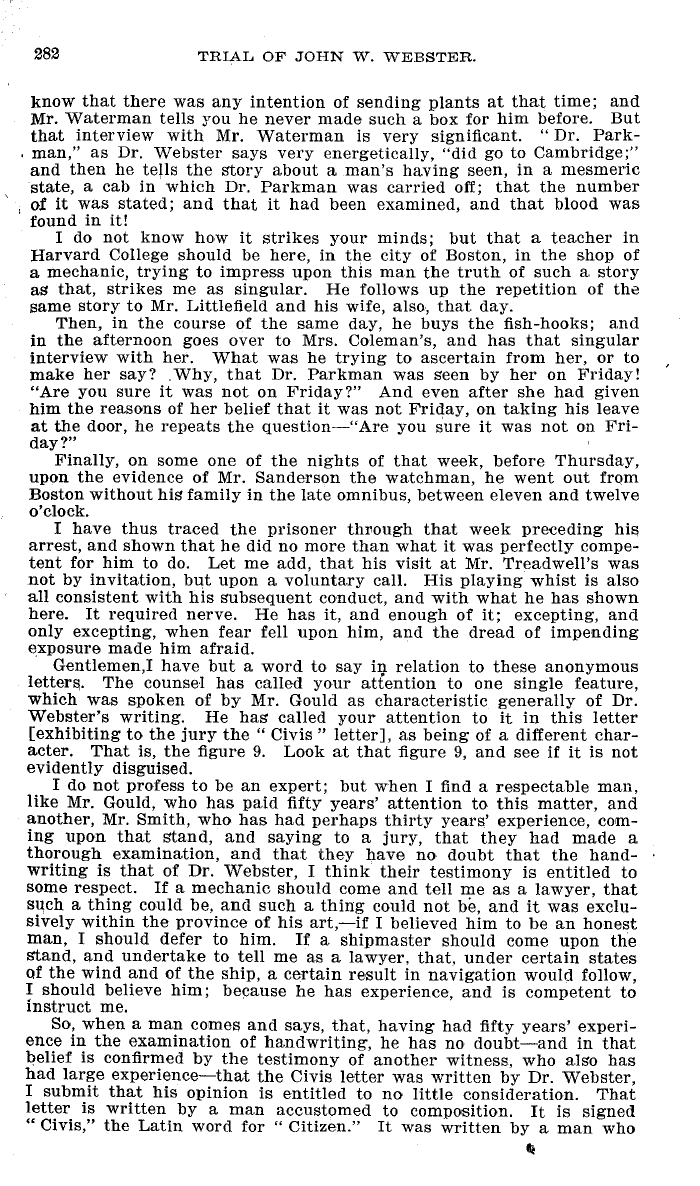|
282 TRIAL OF JOHN W. WEBSTER.
know that there was any intention of sending plants at that time; and
Mr. Waterman tells you he never made such a box for him before. But
that interview with Mr. Waterman is very significant. " Dr. Park-
man," as Dr. Webster says very energetically, "did go to Cambridge;"
and then he tells the story about a man's having seen, in a mesmeric
state, a cab in which Dr. Parkman was carried off; that the number
of it was stated; and that it had been examined, and that blood was
found in it!
I do not know how it strikes your minds; but that a teacher in
Harvard College should be here, in the city of Boston, in the shop of
a mechanic, trying to impress upon this man the truth of such a story
as that, strikes me as singular. He follows up the repetition of the
same story to Mr. Littlefield and his wife, also, that day.
Then, in the course of the same day, he buys the fish-hooks; and
in the afternoon goes over to Mrs. Coleman's, and has that singular
interview with her. What was he trying to ascertain from her, or to
make her say? .Why, that Dr. Parkman was seen by her on Friday!
"Are you sure it was not on Friday?" And even after she had given
him the reasons of her belief that it was not Friday, on taking his leave
at the door, he repeats the question= "Are you sure it was not on Fri-
day?"
Finally, on some one of the nights of that week, before Thursday,
upon the evidence of Mr. Sanderson the watchman, he went out from
Boston without his family in the late omnibus, between eleven and twelve
o'clock.
I have thus traced the prisoner through that week preceding his
arrest, and shown that he did no more than what it was perfectly compe-
tent for him to do. Let me add, that his visit at Mr. Treadwell's was
not by invitation, but upon a voluntary call. His playing whist is also
all consistent with his subsequent conduct, and with what he has shown
here. It required nerve. He has it, and enough of it; excepting, and
only excepting, when fear fell upon him, and the dread of impending
exposure made him afraid.
Gentlemen,I have but a word to say in relation to these anonymous
letters. The counsel has called your attention to one single feature,
which was spoken of by Mr. Gould as characteristic generally of Dr.
Webster's writing. He has called your attention to it in this letter
[exhibiting to the jury the " Givis " letter], as being of a different char-
acter. That is, the figure 9. Look at that figure 9, and see if it is not
evidently disguised.
I do not profess to be an expert; but when I find a respectable man,
like Mr. Gould, who has paid fifty years' attention to this matter, and
another, Mr. Smith, who has had perhaps thirty years' experience, com-
ing upon that stand, and saying to a jury, that they had made a
thorough examination, and that they have no doubt that the hand-
writing is that of Dr. Webster, I think their testimony is entitled to
some respect. If a mechanic should come and tell me as a lawyer, that
such a thing could be, and such a thing could not be, and it was exclu-
sively within the province of his art,-if I believed him to be an honest
man, I should defer to him. If a shipmaster should come upon the
stand, and undertake to tell me as a lawyer, that, under certain states
of the wind and of the ship, a certain result in navigation would follow,
I should believe him; because he has experience, and is competent to
instruct me.
So, when a man comes and says, that, having had fifty years' experi-
ence in the examination of handwriting, he has no doubt-and in that
belief is confirmed by the testimony of another witness, who also has
had large experience-that the Civis letter was written by Dr. Webster,
I submit that his opinion is entitled to no little consideration. That
letter is written by a man accustomed to composition. It is signed
" Civis," the Latin word for " Citizen." It was written by a man who
|

